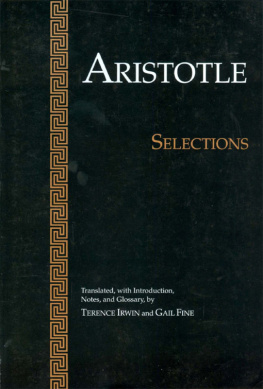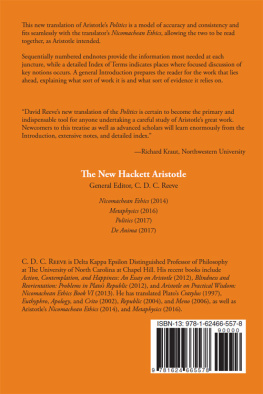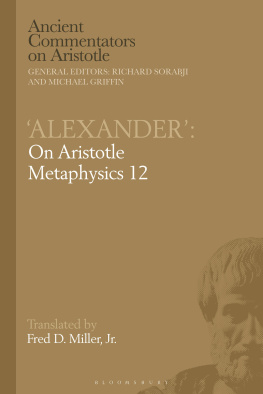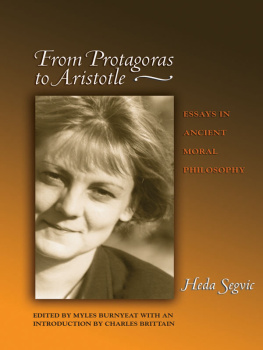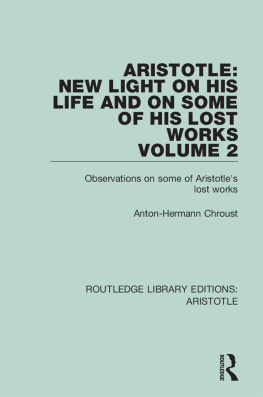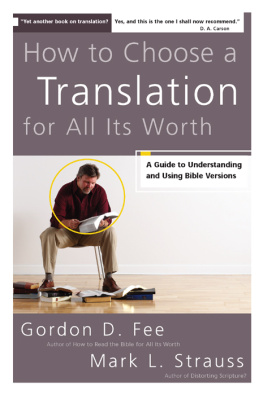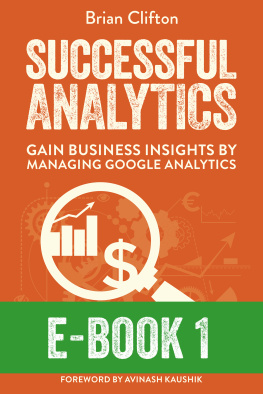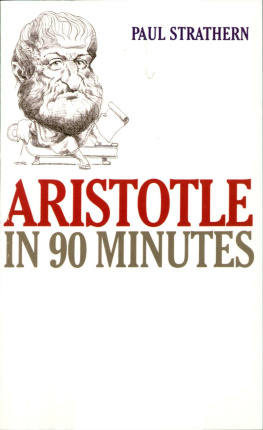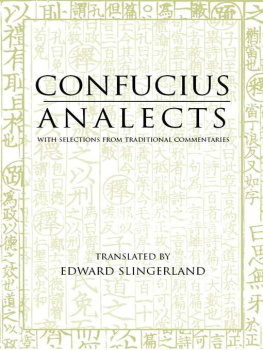ARISTOTLE
Selections
ARISTOTLE
Selections
Translated
with Introduction, Notes, and Glossary
by
Terence Irwin and Gail Fine
Cornell University
Hackett Publishing Company, Inc.
Indianapolis/Cambridge
Copyright 1995 by Terence Irwin and Gail Fine
All rights reserved
Printed in the United States of America
09 10 11 12 13 14 4 5 6 7 8 9 10 11
For further information, please
address the publisher:
Hackett Publishing Company, Inc.
P.O. Box 44937
Indianapolis, Indiana 462440937
www.hackettpublishing.com
Text design by Dan Kirklin
Library of Congress CataloginginPublication Data
Aristotle
[Selections. English. 1995]
Aristotle: selections / translated,
with introduction, notes, and glossary by
Terence Irwin and Gail Fine.
p. cm.
Includes bibliographical references.
ISBN 0915145685 (cloth)
ISBN 0915145677 (pbk.)
1. Philosophy, Ancient.
2. Science, Ancient.
I. Irwin, Terence.
II. Fine, Gail.
III. Title
B407.F56 1995
185dc20
9531470
CIP
ISBN13: 9780915145683 (cloth)
ISBN13: 9780915145676 (pbk.)
ePub ISBN: 9781603847056
to
John Ackrill
and to the memory of
Michael Woods
We began work on these Selections several years ago, at the suggestion of the publisher, who believed that none of the available volumes of selections from Aristotle was suitable for use in an introductory course in ancient philosophy: the available volumes either cost too much or lacked accurate translations or lacked appropriate selections. In response to suggestions by colleagues and readers, we have expanded our initial list of selections; while the volume is still intended primarily for beginners, we hope that it may also be useful in more advanced courses on Aristotle, and in courses in (for instance) religion, political science, English, or rhetoric that consider Aristotle.
Readers are advised to read the last section of the Introduction (This Edition) before using the rest of the volume.
Our translation of the Ethics is extracted (with very slight alterations) from the translation by Terence Irwin (Hackett, 1985). Terence Irwin is also responsible for the Politics, Poetics, and Rhetoric. We bear joint responsibility, to different degrees, for the rest of the volume.
In revising the translations and notes, we have benefited from suggestions by friends and colleagues, and especially from the comments of the publisher's readers. The most recent of these readers was S. Marc Cohen, whose numerous and acute comments and suggestions greatly improved the penultimate version. The earlier readers, who remain anonymous, were also extremely helpful. John Cooper has devoted considerable time and energy to improving our translations and advising us on policy; we are very grateful for all his help. Despite the efforts of all these readers, many errors must still be present in this published version, and we will be grateful for any criticisms, suggestions, and corrections we receive.
It gives us great pleasure to dedicate this volume to John Ackrill, Emeritus Professor of the History of Philosophy in the University of Oxford and Emeritus Fellow of Brasenose College, and to the memory of Michael Woods, late Fellow of Brasenose College. Both of them have helped to raise the standard of English translations of Greek philosophical texts; John Ackrill has supervised the Clarendon Aristotle Series for many years, and Michael Woods supervised the Clarendon Plato Series until his death. Each of them has also helped both of us in many different ways with advice, encouragement, and friendship over the years.
Terence Irwin
Gail Fine
Sage School of Philosophy
Cornell University
Ithaca, New York
January 1995
Works of Aristotle
The works of Aristotle are cited by abbreviations of their conventional Latin or English titles. We list both Latin and English titles below; for each treatise we translate we have used whichever title seems to be more commonly used in current English. (In many cases the English titles are mere Anglicizations rather than proper translations.) In cases where no English title is in common use, a rough translation has been placed in square brackets. More information on the titles is given in the first note to many of the treatises.
| APo | Analytica Posteriora | Posterior Analytics |
| APr | Analytica Priora | Prior Analytics |
| Catg. | Categoriae | Categories |
| DA | De Anima | On the Soul |
| DC | De Caelo | On the Heavens |
| DI | De Interpretatione | On Interpretation |
| EE | Ethica Eudemia | Eudemian Ethics |
| EN | Ethica Nicomachea | Nicomachean Ethics |
| GA | De Generatione Animalium | Generation of Animals |
| GC | De Generatione | Generation and |
| et Corruptione | Corruption |
| HA | Historia Animalium | History of Animals |
| IA | De Incessu Animalium | Progression of Animals |
| MA | De Motu Animalium | Movement of Animals |
| Met. | Metaphysica | Metaphysics |
| Metr. | Meteorologica | Meteorology |
| MM | Magna Moralia | [Great Ethics] |
| PA | De Partibus Animalium | Parts of Animals |
| Phys. | Physica | Physics |
| PN | Parva Naturalia | [Short Natural Treatises] |
| Poet. | De Arte Poetica | Poetics |
| Pol. | Politica | Politics |
| Rhet. | Rhetorica | Rhetoric |
| Top. | Topica | Topics |
| Other abbreviations |
| ROT | The Revised Oxford Translation (see Further Reading) |
| OCD | Oxford Classical Dictionary (Oxford, 1970) |
| OCT | Oxford Classical Text (see [2)) |
| DK | Diels-Kranz (see [24)) |

1. Aristotle's life
Aristotle was born in Stagira in Macedon (now part of northern Greece) in 384 B.C. In his lifetime the kingdom of Macedon, first under Philip and then under Philip's son Alexander (the Great), conquered the Greek cities in Europe and Asia, and then went on to conquer the Persian Empire. The Macedonian rulers made elaborate efforts to present themselves as Greeks; they were not entirely successful in these efforts, and many Greeks regarded them as foreign invaders. Though Aristotle spent much of his adult life in Athens, he was not an Athenian citizen; he was closely linked to the kings of Macedon, and he was evidently affected by the volatile relations between the Greek cities, especially Athens, and Macedon. (The bitterly antiMacedonian speeches of the orator Demosthenes show what some Athenians thought about Macedonians.)
Aristotle was the son of Nicomachus, a doctor who had been attached to the Macedonian court. In 367 Aristotle came to Athens, and he was a member of PLATOS
These pieces of fairly reliable information have encouraged both ancient and modern writers to try to write biographies of Aristotle, tracing the development of his thought through the different periods of his life. The evidence for any detailed biographical construction, however, is lacking. The best we can do is to pick out some aspects of Aristotle's life that are probably significant for his philosophical career.
Next page
